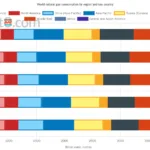Original Report: www.cbc.ca(full story)
- The Canadian Chamber of Commerce has issued a serious warning regarding the potential impacts of U.S. protectionist policies.
- Economic interdependence between Canada and the U.S. is underappreciated by many Americans, especially during times of geopolitical uncertainty.
A recent report from the Canadian Chamber of Commerce highlights significant concerns about the U.S. trade policies as the presidential election approaches. Authored by Trevor Tombe, an economics professor at the University of Calgary, the report emphasizes the risks posed by protectionist measures, particularly the tariffs proposed by Donald Trump, which could detrimentally affect both nations’ economies.
The intertwining of Canadian and U.S. economies is noteworthy, with most Canadians recognizing this connection while many Americans remain unaware. Tombe warns that proposed tariffs could severely impact Alberta’s energy sector and Ontario’s automotive production. Preparations are being made by Canadian officials engaging with U.S. counterparts, readying for potential election outcomes. Both presidential candidates advocate for protectionist policies, causing trade uncertainty, which will be pivotal during the upcoming review of the Canada-U.S.-Mexico agreement scheduled for 2026.
Trump’s plans for a 10-percent nationwide tariff on imports, if enacted, would inflict damage on both economies. Tombe’s report anticipates a decline of up to one percent in the Canadian economy, equating to approximately $30 billion annually. Conversely, the U.S. could incur about $125 billion in economic costs. The repercussions would escalate if other nations retaliated, leading to a projected 1.5 percent drop in Canadian incomes and a 1.6 percent decline in productivity, translating to roughly $45 billion in lost economic activity—a significant blow akin to a major recession.
Historically, similar policies have been implemented, such as the 10-percent surcharge during the 1971 “Nixon Shock,” which saw a 2.6 percent decline in Canadian imports to the U.S. Experts believe that contemporary trade relations are more complex, and any disruption could have amplified consequences.
The report underscores the vast, intertwined benefits of the Canada-U.S. economic relationship, driven by intricate supply chains across various sectors. Notably, Canada is the prime export destination for 34 U.S. states, with trade in Michigan, Illinois, and Wisconsin critically impacting their economies. Disruptions would reverberate equally across borders.
Former U.S. ambassador Bruce Heyman cautions about the hidden risks of Trump’s tariffs on the oil sector and expresses concerns about their detrimental effects on Alberta’s economy. The implications extend to Ontario and Manitoba, particularly affecting their automotive and transport industries, where a potential 20 percent export decline to the U.S. could threaten local businesses significantly.







